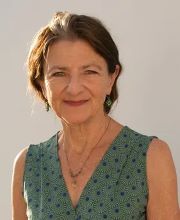Although each of the lives of the people that Benedict interviewed are tragic, she was motivated to continue her work because of the connections she made and her admiration for the grit and resolve she witnessed in many of them. She remarked, “Well, I am overwhelmed sometimes. But the thing is, even as we talk, we’re also joking, we’re also laughing, we’re eating, we’re taking walks, we’re just being human beings in everyday life, and I’m always feeling so moved by the way people can survive these things and still be generous to each other, still make real friendships. Part of the theme of this novel is the deep friendships between these women… between mothers and children… also grandmothers and grandchildren, all of that is also in there. So, I suppose the comfort is… just the nobility of some human spirits and the determination to carry on no matter what.”

I think anyone who has compassion for people who are less fortunate… always feels that they can’t do enough. Even if you’re doing a whole lot, you still feel like you can’t do enough. You have to learn to live with that feeling, to accept that there’s only so much an individual can do… We just do our best. I think the one thing we shouldn’t do is nothing.”


No one puts their children in a boat unless the water is safer than the land.”

Podcast: Play in new window | Download
Subscribe: RSS

Want to join the discussion?
Feel free to contribute!